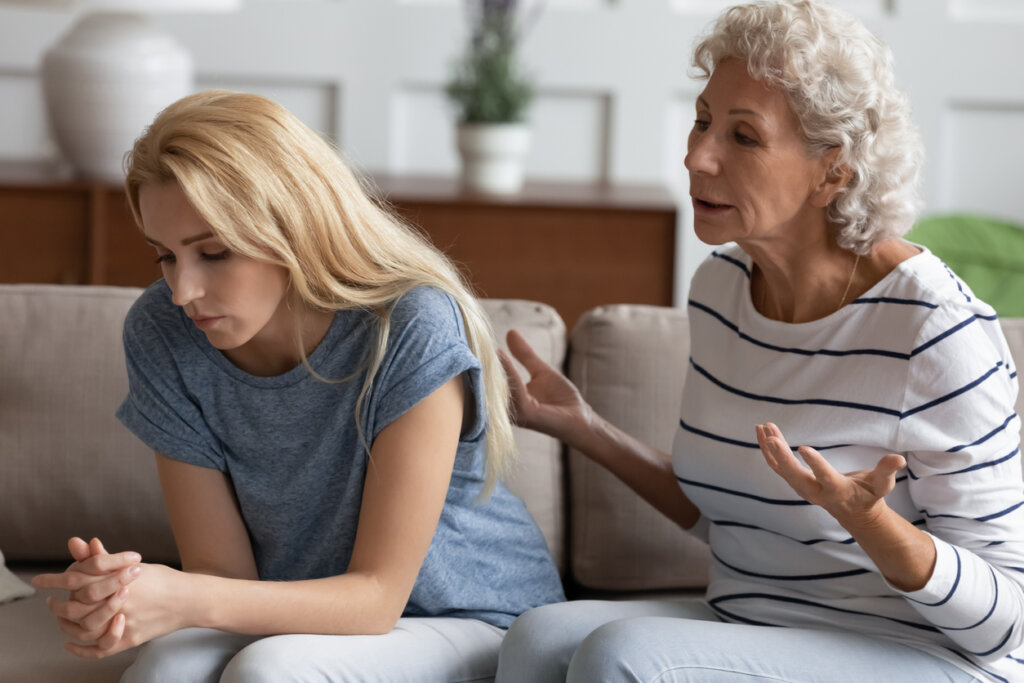Why Do You Hurt the Ones You Love?


Written and verified by the psychologist Elena Sanz
At some time or another, you’ve probably made the mistake of taking out your frustrations on your loved ones. You show your worst side to them, making them undeserving victims of your selfish, inconsiderate, cruel, or impulsive behavior. However, with neighbors, acquaintances, and others who are less close to you, you tend to be friendly and polite, even at the most difficult of moments. So, why do you hurt the ones you love?
It’s not because you’re a bad person or your relationships are poor, or even that you’re suffering from some psychological problem. In fact, it’s a really common situation that happens to all of us to a greater or lesser extent. However, knowing the reasons that lead you to act in this way can help you understand this kind of behavior.

Why do you hurt the ones you love?
We’re not talking about acts that deliberately seek to harm, nor to manifestations of a narcissistic or psychopathic disorder. We mean those moments when you lose your temper over one of your partner’s bad habits, yell at your mother when she tries to help you, or make a hurtful comment to a close friend.
Of course, you appreciate these people and don’t wish to cause them any pain. Yet, these situations occur more frequently than you’d like. So, why do you hurt the ones you love? Here are the main reasons.
They’re always there
Sometimes, the simplest answer is the most logical. You hurt the ones you love because they’re always there. They’re the people with whom you spend most of your time. Therefore, they’re around when you’re thriving and happy, but also when you feel frustrated, anxious, and dissatisfied.
In these unpleasant situations, in which negative emotions overwhelm you and you don’t know how to control them, the people around you are those who pay the consequences. These are often your relatives.
When you meet with other people, you do it deliberately, with the intention and purpose of sharing a pleasant and fun moment and you’re ready to play that role. On the other hand, the people you share your life with see the other side of you.
They love you the most
You’re perfectly capable of modulating your behavior in different contexts. For example, if you feel upset or frustrated at work, you’re able to camouflage your emotions to maintain your composure with your boss.
However, you need to release your accumulated tension, so you do it when you get home because this is where you feel safe with the people you love the most. They’re also the ones who love you the most. Therefore, you’re sure that they’ll put up with your bad behavior without any major consequences.
So, you let your emotions out unfiltered, knowing that it won’t result in rejection or abandonment, as could happen with those who are less close to you. Indeed, only with those who are close to you do you feel the confidence to show your vulnerability, even if it’s sometimes misdirected and comes out in the form of outbursts of anger or gestures of contempt.
They trigger trauma
Another important point concerns how these people make you feel. Naturally, you don’t have the same degree of intimacy and emotional connection with a work colleague as with your partner. But, this intimacy can become a trigger for certain traumas or internal situations that you haven’t dealt with and that still hurt you.
In childhood, many people have experiences with their parents that cause different wounds. For example, abandonment, rejection, betrayal, etc. They may also have experienced them in relationships with their peers, suffering criticism or bullying. In adulthood, this pain can be revived and reactivated through situations that remind us of the original pain, and that trigger disproportionate reactions.
Therefore, you might react with great anger to a small comment from your partner because it reminds you of your father’s constant criticism. Or, you may withdraw and isolate yourself in the face of a disagreement because you feel rejected, just as you did in your childhood. Due to the greater degree of connection between you, it’s the people you love the most who are more likely to rekindle those wounds and trigger negative reactions in you.
You feel insecure and are afraid of disconnection
Finally, there’s one curious explanation as to why you hurt the ones you love. It’s the fact that you do it because you don’t feel safe in the relationship and are afraid of losing your connection. This usually happens if you suffer from significant internal insecurity and tend to feel ashamed or unworthy of love and contact.
It’s this shame that triggers your impulsive and aversive behaviors. You emit them in an attempt to regain security. In effect, by lashing out at the other person, by complaining, yelling, threatening, or manipulating, you unconsciously seek to place them in a more submissive and vulnerable position thus reaffirming your love and commitment.
Paradoxically, although you might sometimes achieve the desired effect, in the long term your behavior will only weaken the bond and wear down your relationship.

We all hurt the ones we love but we don’t have to
In short, this unfortunate behavior is common to all of us. That said, this doesn’t imply that you can’t anything about it. In fact, it’s within your power to become aware of your actions and resolve what’s leading you to act in this way.
You have to take charge of your emotions and learn to manage them properly. You might be feeling anger, disgust, frustration, or sadness, but it isn’t healthy for these feelings to overwhelm you and take control of you.
There are various mechanisms, techniques, and exercises that you can implement to learn how to deal with these challenging states. Moreover, you must learn to be assertive and communicate with respect. No emotion justifies the mistreatment of another person.
For this reason, if you feel that you frequently make the mistake of venting your negative emotions on those who love you, punishing them for the insecurity you feel, and projecting your unhealed wounds onto them, you should seek professional help. This will be the first step toward your greater well-being and toward healthier relationships.
At some time or another, you’ve probably made the mistake of taking out your frustrations on your loved ones. You show your worst side to them, making them undeserving victims of your selfish, inconsiderate, cruel, or impulsive behavior. However, with neighbors, acquaintances, and others who are less close to you, you tend to be friendly and polite, even at the most difficult of moments. So, why do you hurt the ones you love?
It’s not because you’re a bad person or your relationships are poor, or even that you’re suffering from some psychological problem. In fact, it’s a really common situation that happens to all of us to a greater or lesser extent. However, knowing the reasons that lead you to act in this way can help you understand this kind of behavior.

Why do you hurt the ones you love?
We’re not talking about acts that deliberately seek to harm, nor to manifestations of a narcissistic or psychopathic disorder. We mean those moments when you lose your temper over one of your partner’s bad habits, yell at your mother when she tries to help you, or make a hurtful comment to a close friend.
Of course, you appreciate these people and don’t wish to cause them any pain. Yet, these situations occur more frequently than you’d like. So, why do you hurt the ones you love? Here are the main reasons.
They’re always there
Sometimes, the simplest answer is the most logical. You hurt the ones you love because they’re always there. They’re the people with whom you spend most of your time. Therefore, they’re around when you’re thriving and happy, but also when you feel frustrated, anxious, and dissatisfied.
In these unpleasant situations, in which negative emotions overwhelm you and you don’t know how to control them, the people around you are those who pay the consequences. These are often your relatives.
When you meet with other people, you do it deliberately, with the intention and purpose of sharing a pleasant and fun moment and you’re ready to play that role. On the other hand, the people you share your life with see the other side of you.
They love you the most
You’re perfectly capable of modulating your behavior in different contexts. For example, if you feel upset or frustrated at work, you’re able to camouflage your emotions to maintain your composure with your boss.
However, you need to release your accumulated tension, so you do it when you get home because this is where you feel safe with the people you love the most. They’re also the ones who love you the most. Therefore, you’re sure that they’ll put up with your bad behavior without any major consequences.
So, you let your emotions out unfiltered, knowing that it won’t result in rejection or abandonment, as could happen with those who are less close to you. Indeed, only with those who are close to you do you feel the confidence to show your vulnerability, even if it’s sometimes misdirected and comes out in the form of outbursts of anger or gestures of contempt.
They trigger trauma
Another important point concerns how these people make you feel. Naturally, you don’t have the same degree of intimacy and emotional connection with a work colleague as with your partner. But, this intimacy can become a trigger for certain traumas or internal situations that you haven’t dealt with and that still hurt you.
In childhood, many people have experiences with their parents that cause different wounds. For example, abandonment, rejection, betrayal, etc. They may also have experienced them in relationships with their peers, suffering criticism or bullying. In adulthood, this pain can be revived and reactivated through situations that remind us of the original pain, and that trigger disproportionate reactions.
Therefore, you might react with great anger to a small comment from your partner because it reminds you of your father’s constant criticism. Or, you may withdraw and isolate yourself in the face of a disagreement because you feel rejected, just as you did in your childhood. Due to the greater degree of connection between you, it’s the people you love the most who are more likely to rekindle those wounds and trigger negative reactions in you.
You feel insecure and are afraid of disconnection
Finally, there’s one curious explanation as to why you hurt the ones you love. It’s the fact that you do it because you don’t feel safe in the relationship and are afraid of losing your connection. This usually happens if you suffer from significant internal insecurity and tend to feel ashamed or unworthy of love and contact.
It’s this shame that triggers your impulsive and aversive behaviors. You emit them in an attempt to regain security. In effect, by lashing out at the other person, by complaining, yelling, threatening, or manipulating, you unconsciously seek to place them in a more submissive and vulnerable position thus reaffirming your love and commitment.
Paradoxically, although you might sometimes achieve the desired effect, in the long term your behavior will only weaken the bond and wear down your relationship.

We all hurt the ones we love but we don’t have to
In short, this unfortunate behavior is common to all of us. That said, this doesn’t imply that you can’t anything about it. In fact, it’s within your power to become aware of your actions and resolve what’s leading you to act in this way.
You have to take charge of your emotions and learn to manage them properly. You might be feeling anger, disgust, frustration, or sadness, but it isn’t healthy for these feelings to overwhelm you and take control of you.
There are various mechanisms, techniques, and exercises that you can implement to learn how to deal with these challenging states. Moreover, you must learn to be assertive and communicate with respect. No emotion justifies the mistreatment of another person.
For this reason, if you feel that you frequently make the mistake of venting your negative emotions on those who love you, punishing them for the insecurity you feel, and projecting your unhealed wounds onto them, you should seek professional help. This will be the first step toward your greater well-being and toward healthier relationships.
All cited sources were thoroughly reviewed by our team to ensure their quality, reliability, currency, and validity. The bibliography of this article was considered reliable and of academic or scientific accuracy.
- Cassiello-Robbins, C., Wilner, J. G., Peters, J. R., Bentley, K. H., & Sauer-Zavala, S. (2019). Elucidating the relationships between shame, anger, and self-destructive behaviors: The role of aversive responses to emotions. Journal of contextual behavioral science, 12, 7-12.
- Kowalski, R. M. (Ed.). (1997). Aversive interpersonal behaviors. Springer Science & Business Media.
This text is provided for informational purposes only and does not replace consultation with a professional. If in doubt, consult your specialist.







